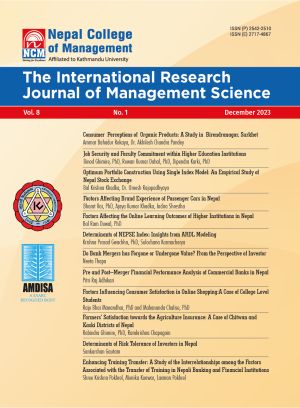Factors Affecting Brand Experience of Passenger Cars in Nepal
DOI:
https://doi.org/10.3126/irjms.v8i1.60687Keywords:
Attribute, Price, Appearance, Brand Personality, Self-congruityAbstract
Purpose- The major goal of the research was to examine the influence of car's attributes, car's price, car's appearance, brand personality of car and self-congruity on brand experience toward passenger cars.
Design/Methodology/Approach- Positivist epistemology with predetermined hypotheses was used in the study. A six-point Likert scale structured questionnaire was used for collection the primary data. The population of the study was all passenger car users in Nepal. The sample size was 411 passenger car users. A judgmental sampling technique was used. A causal research design was used for the study. The effect of independent variables on dependent variables was identified through path analysis using Structural Equation Modeling.
Findings- The result of the study showed that attributes, brand personality and self-congruity have significant positive impact on brand experience but price and appearance have no significant influence on brand experience for passenger cars in Nepal.
Originality/Value-The study's findings offer a guideline for future researchers and business people for development of market. The conclusive findings of the research will contribute to brand experience theory. The study offers valuable insights to manufacturers and sellers for understanding the consumer behavior and brand experience of customers regarding passenger cars.
Implications- The findings of the study help for designing of marketing strategies to manufacturer and sellers towards the passenger cars. The findings have implications for developing and implementing brand experience strategies. Theoretically, it infers that consumers are more emotional than rational for buying prestigious products.




